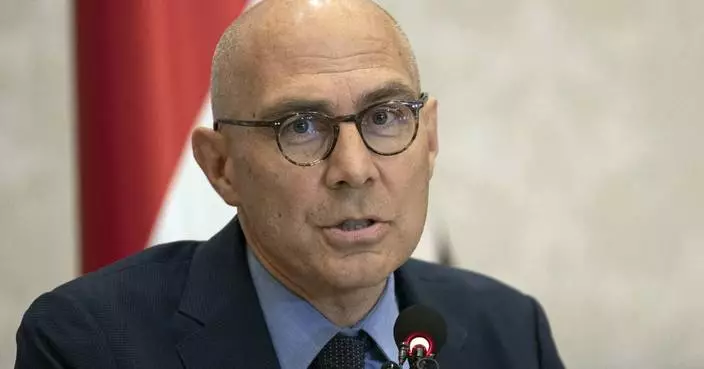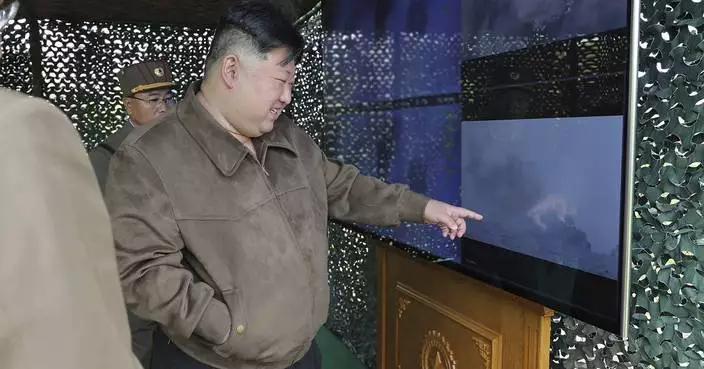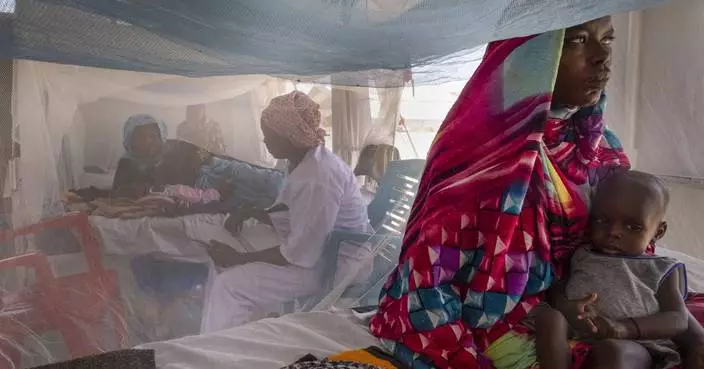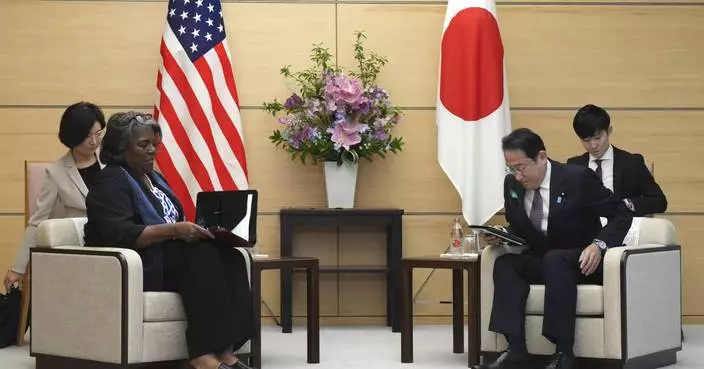The U.N. Security Council is facing rival resolutions calling for a cease-fire in Syria's last rebel stronghold in Idlib, "to avoid a further deterioration of the already catastrophic humanitarian situation."
Germany, Belgium and Kuwait finalized their text Wednesday afternoon and called for a vote Thursday. Their draft resolution calls for a cessation of hostilities in Idlib governorate at noon Damascus time Saturday.
Soon after, Russia and China also put their rival text in a final form for a vote. It calls for a cessation of hostilities in September but gives no date.
Their resolution would also include exemptions for "military operations against individuals, groups, undertakings and entities associated with terrorist group, as designated by the Security Council."
Germany, Belgium and Kuwait, who are serving two-year terms on the Security Council, are in charge of drafting resolutions on Syria's humanitarian situation. Diplomats said they have been meeting with Russia to try to reach agreement on a text following a spate of attacks on hospitals, health facilities and aid workers.
The diplomats, speaking on condition of anonymity because discussions have been private, said the three countries insist that the text include language that counter-terrorism activities must comply with international humanitarian law, but Russia objected.
The draft resolution by Germany, Belgium and Kuwait "demands that member states ensure that all measures taken to counter terrorism, including in Idlib governorate, comply with their obligations under international law, including international humanitarian law, international human rights law and international refugee law."
It also stresses "that counter-terrorism operations do not absolve parties to armed conflicts of their obligations under international humanitarian law, including their obligation to distinguish between civilian populations and combatants."
And it urges all parties to the Syrian conflict to distinguish between civilians and combatants, to apply the principle of "proportionality," and to take all feasible precautions "to avoid and in any event minimize harm to civilians and civilian objects."
The China-Russia draft resolution makes no mention of counter-terrorism operations but would reiterate the council's demand for all parties to comply with international law and allow access to people in need, and to immediately cease all attacks against civilians and medical and humanitarian personnel.
It also calls for all parties to "demilitarize" hospitals and other civilian facilities and avoid establishing military positions in populated areas.
On Monday, the leaders of Russia, Turkey and Iran agreed to de-escalate the volatile situation in Idlib while combatting extremists and protecting civilians.
Idlib, which has an estimated population of three million, is dominated by the al-Qaida-linked group Hayat Tahrir al-Sham. Syrian forces, backed by Russia and Iran, targeted the armed group in a four-month ground and air offensive but civilians have been widely affected.
Hundreds of thousands of Syrians, some already displaced from other parts of the war-torn country, have moved toward Turkey's border.
A cease-fire that went into effect at the end of August has been holding despite some violations.
A major conflict in Idlib has raised the possibility of a mass refugee flow to Turkey, which already hosts 3.6 million Syrian refugees.
A joint statement issued at the end of Monday's meeting said the three leaders underscored the need "to fully implement" an agreement reached between Turkey and Russia last year for a de-escalation zone in Idlib and "to take concrete steps to reduce violations."
They expressed alarm "about the risk of further deterioration of the humanitarian situation," according to the statement.
"We all stand for Syria's territorial integrity and insist that after the problems of security and the fight against terrorists are resolved, Syria's territorial integrity will be fully restored. This concerns withdrawal of all foreign troops from Syria's territory," the statement said.
WASHINGTON (AP) — Lawyers for an American believed to be held by the Taliban for nearly two years are asking a United Nations human rights investigator to intervene, citing what they say is cruel and inhumane treatment.
Ryan Corbett was abducted Aug. 10, 2022, after returning to Afghanistan, where he and his family had been living at the time of the collapse of the U.S.-based government there a year earlier. He arrived on a valid 12-month visa to pay and train staff as part of a business venture he led aimed at promoting Afghanistan's private sector through consulting services and lending.
Corbett has since been shuttled between multiple prisons, though his lawyers say he has not been seen since last December by anyone other than the people with whom he was detained.
In a petition sent Thursday, lawyers for Corbett say that he's been threatened with physical violence and torture and has been malnourished and deprived of medical care. He's been held in solitary confinement, including in a basement cell with almost no sunlight and exercise, and his physical and mental health have significantly deteriorated, the lawyers say.
Corbett has been able to speak with his family by phone five times since his arrest, including last month. His family has not been able to see him — his only visits have been two check-ins from a third-party government — and their characterizations of his mistreatment are based on accounts from recently released prisoners who were with him and his openly dispirited tone in conversations.
“During Mr. Corbett’s most recent call with his wife and children, Mr. Corbett indicated that the mental torture and anguish have caused him to lose all hope,” said the petition, signed by the Corbett family attorneys, Ryan Fayhee and Kate Gibson.
The petition is addressed to Alice Edwards, an independent human rights investigator and the special rapporteur for torture in the Office of the High Commissioner for Human Rights at the U.N. It asks Edwards, who was appointed by the U.N. Human Rights Council, to “urgently reach out to the Taliban to secure Mr. Corbett’s immediate release and freedom from torture, as guaranteed by international law.”
"This situation is just dragging on, and I’m increasingly concerned and taking steps that I hope will make a difference and help the situation — just increasingly concerned and panicking about Ryan’s deteriorating health and physical and mental health," Corbett's wife, Anna, said in an interview. “And that was leading me to take this next step.”
The U.S. government is separately working to get Corbett home and has designated him as wrongfully detained. A State Department spokesman told reporters last month that officials had continually pressed for Corbett's release and were “using every lever we can to try to bring Ryan and these other wrongfully detained Americans home from Afghanistan."
A spokesperson for the Interior Ministry in Afghanistan said this week that it had no knowledge of Corbett's case.
Corbett, of Dansville, New York, first visited Afghanistan in 2006 and relocated there with his family in 2010, supervising several non-governmental organizations.
The family was forced to leave Afghanistan in August 2021 when the Taliban captured Kabul, but he returned the following January so that he could renew his business visa. Given the instability on the ground, the family discussed the trip and “we were all pretty nervous,” Corbett's wife said.
But after that first uneventful trip, he returned to the country in August 2022 to train and pay his staff and resume a business venture that involved consulting services, microfinance lending and evaluating international development projects.
While on a trip to the northern Jawzjan province, Corbett and a Western colleague were confronted by armed members of the Taliban and were taken first to a police station and later to an underground prison.
Anna Corbett said that when she learned her husband had been taken to a police station, she got “really scared” but that he was optimistic the situation would be quickly resolved.
That, however, did not happen, and Anna Corbett, who has three teenage children and makes regular trips to Washington, said she's trying to advocate as forcefully as she can while not letting “anxiety take over.”
“I feel like it’s the uncertainty of all of it that just is so difficult because you just don’t know what’s going to come at you — what call, what news," she said. "And I’m worried about Ryan and the effect of the trauma on him and then also on my kids, just what they’re experiencing. I've tried to protect them the best I could, but this is so difficult.”
Associated Press writer Riazat Butt in Kabul, Afghanistan, contributed to this report.
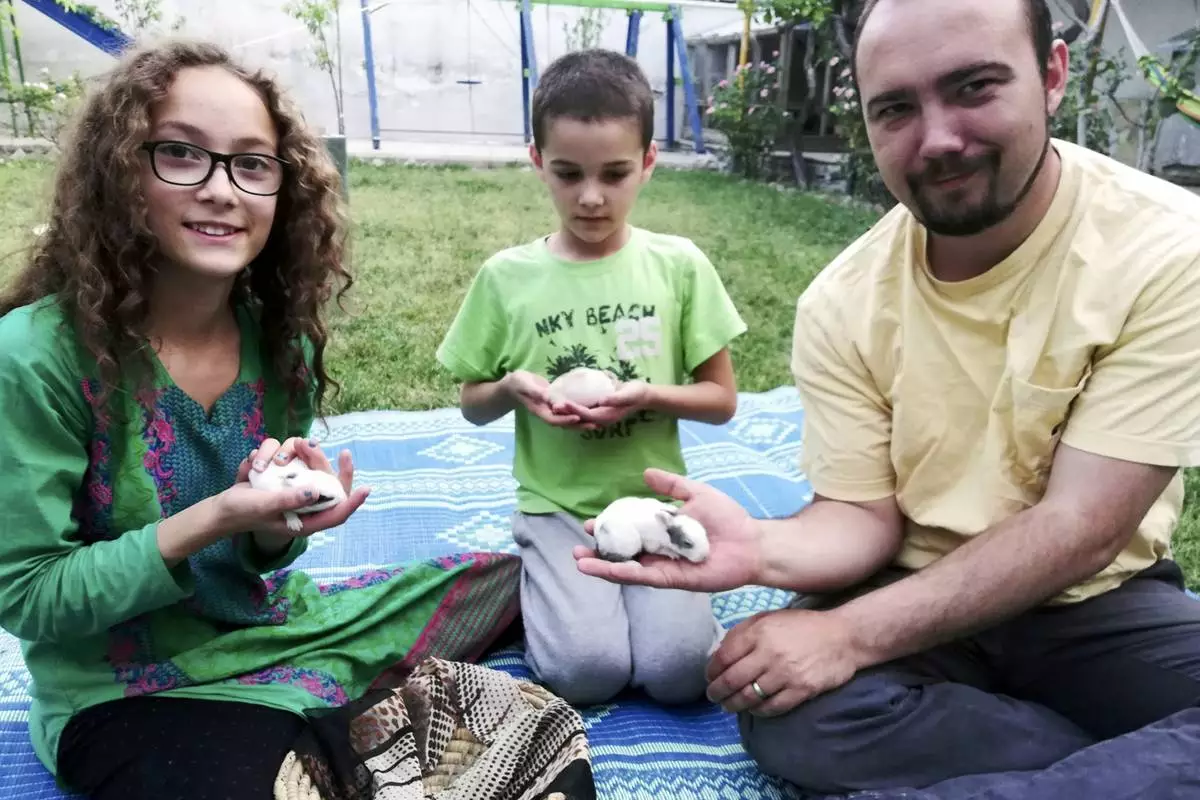
This family photo shows Ryan Corbett holding rabbits with his daughter Miriam and son Caleb in Kabul, Afghanistan in 2020. Lawyers for Corbett, believed held by the Taliban for nearly two years, are asking a United Nations human rights investigator to intervene, citing what they say is cruel and inhumane treatment. Corbett was abducted on August 10, 2022 after returning to Afghanistan, where he and his family had been living at the time of the collapse of the U.S.-based government there one year earlier, on a valid 12-month business visa to pay and train staff. (AP Photo/Anna Corbett)





